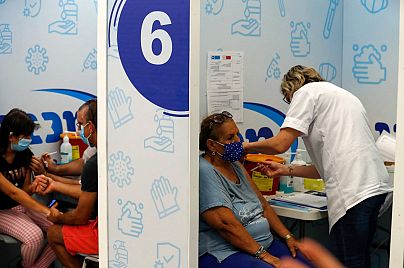The efficacy of two COVID vaccines against the Delta variant drops after 90 days, a study has found, giving possible rise to booster shots.
The Pfizer and AstraZeneca coronavirus vaccines are less effective against the Delta variant three months after inoculation, a major new UK study has found.
After 90 days of two doses of the vaccines, the efficacy of Pfizer-BioNTech slipped to 75 per cent from 93 per cent two weeks after being jabbed.
Oxford/AstraZeneca’s efficiency dropped to 61 per cent after three months from 71 per cent two weeks after the second dose.
The drop in effectiveness was also more visible for those aged 35 years and above.
But the study highlighted both vaccines still staved off the majority of COVID variants.
"With Delta, Pfizer-BioNTech and Oxford/AstraZeneca vaccines still offer good protection against new infections," the study said.
"Both of these vaccines, at two doses, are still doing really well against Delta... When you start very, very high, you’ve got a long way to go," said Sarah Walker, an Oxford professor of medical statistics and chief investigator for the survey.
The study was produced by the University of Oxford and the Office for National Statistics.
It analysed the periods before and after the Delta variant became prevalent.
Between December 2020 and May 2021, it analysed more than 2.5 million swabs from 380,000 adults. Between May 17 and August 1, it analysed the test results of 360,000 people.
Neither vaccine was found to be as effective against the Alpha variant, which was first identified in the UK in September 2020.
Researchers also said there was insufficient data for Moderna, but said: "A single dose of the Moderna vaccine has similar or greater effectiveness against the Delta variant as single doses of the other vaccines".
The researchers would not project how much more the protection would drop over time.
Vaccine boosters and fairness
The findings may prompt calls for booster shots to those who have already received double vaccine doses.
On Wednesday, the United States said those who had both doses of the Pfizer or Moderna vaccine will get a third after eight months.
Israel has also started administering third doses to those aged over 50.
The World Health Organization (WHO) condemned the rush by wealthy nations to give booster shots as millions of people in poor countries have yet to receive a single dose.
Up until now, only about 32 per cent of the world has received one dose.
"We are planning to hand out extra life jackets to people who already have life jackets, while we are leaving other people to drown without a single life jacket," WHO emergencies chief Mike Ryan said on Wednesday.












